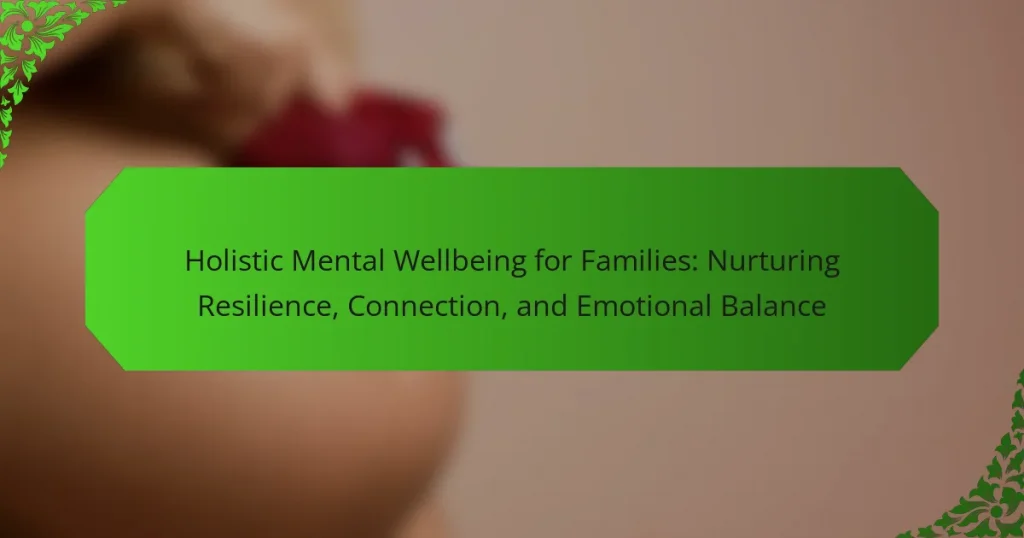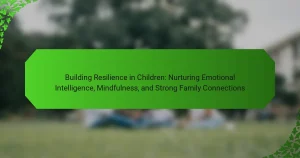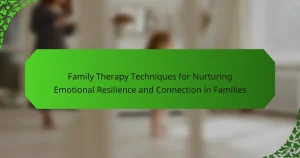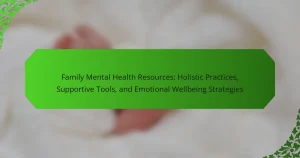Holistic mental wellbeing for families enhances resilience, connection, and emotional balance. This article explores the importance of family dynamics on mental health, the benefits of shared activities, and strategies for open communication. It also discusses unique mindfulness practices and expert insights that can support emotional growth. By implementing these approaches, families can create a nurturing environment that promotes overall wellbeing.
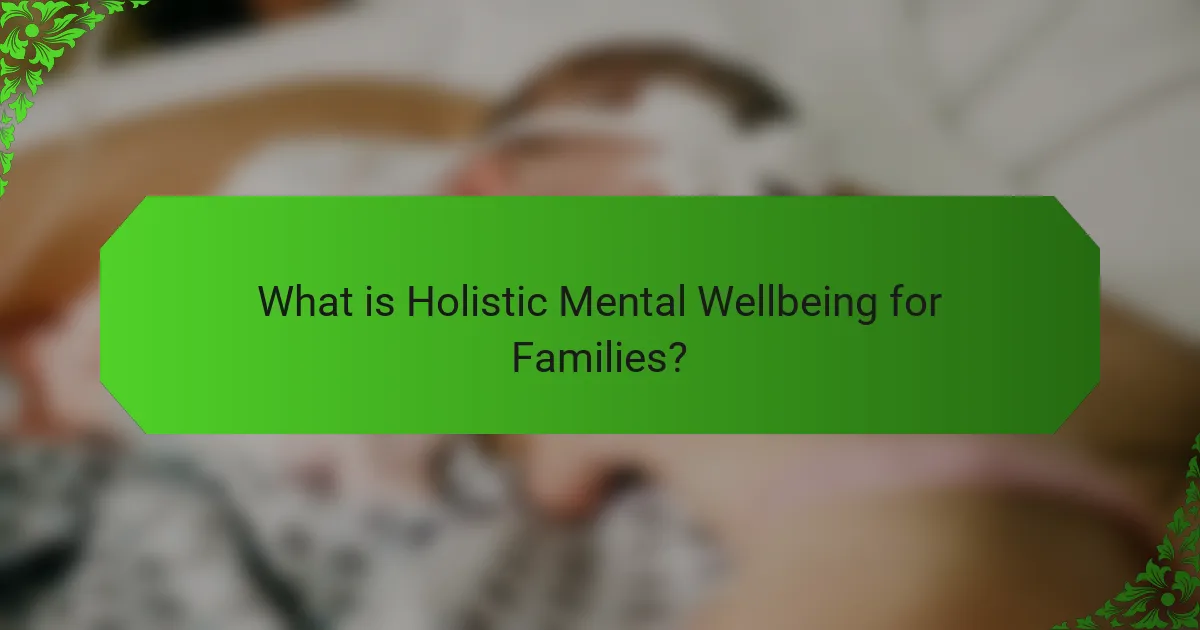
What is Holistic Mental Wellbeing for Families?
Holistic mental wellbeing for families encompasses nurturing resilience, fostering connection, and achieving emotional balance. This approach integrates physical, emotional, and social health, recognizing that family dynamics significantly influence individual mental health.
Families can enhance holistic wellbeing by engaging in shared activities, promoting open communication, and supporting each other through challenges. Research indicates that strong family bonds contribute to improved mental health outcomes, reducing stress and enhancing coping mechanisms.
Key attributes include emotional support, shared experiences, and conflict resolution strategies. These elements cultivate a nurturing environment, essential for developing resilience in family members. By prioritizing holistic practices, families can create a foundation for lasting emotional balance and connection.
How does it differ from traditional mental health approaches?
Holistic mental wellbeing differs from traditional mental health approaches by emphasizing the interconnectedness of mind, body, and spirit. Traditional methods often focus solely on symptom management and diagnosis, while holistic practices nurture resilience, connection, and emotional balance within families. Holistic approaches prioritize preventive care and promote healthy relationships, fostering a supportive environment for emotional growth. This unique perspective encourages individuals to engage in self-care practices, such as mindfulness and community involvement, enhancing overall wellbeing. As a result, families can cultivate stronger bonds and better navigate life’s challenges together.
Why is holistic mental wellbeing important for family dynamics?
Holistic mental wellbeing is crucial for family dynamics as it fosters resilience, strengthens connections, and promotes emotional balance. Families that prioritize holistic mental health experience improved communication and understanding. This approach nurtures a supportive environment, enabling members to navigate challenges together. Research indicates that families practicing holistic wellbeing report higher satisfaction and lower conflict rates. Prioritizing mental wellbeing cultivates a sense of belonging, essential for healthy family relationships.

What are the universal benefits of holistic mental wellbeing?
Holistic mental wellbeing fosters resilience, connection, and emotional balance in families. It enhances communication, reduces stress, and promotes a supportive environment. Families practicing holistic approaches report improved mental health and stronger relationships. Engaging in shared activities and mindfulness enhances emotional intelligence and coping skills.
How does it promote emotional balance across family members?
Holistic mental wellbeing promotes emotional balance among family members by fostering resilience and connection. Practices such as mindfulness, open communication, and shared activities strengthen bonds, reduce stress, and enhance emotional understanding. Families that engage in these practices report improved emotional health and stronger relationships. As a result, emotional balance becomes a shared goal, encouraging empathy and support within the family unit.
What role does resilience play in family wellbeing?
Resilience significantly enhances family wellbeing by fostering emotional strength and adaptability. It enables families to navigate challenges together, promoting deeper connections and reducing stress. Research shows that resilient families exhibit better communication and support systems, leading to improved mental health outcomes. Resilience cultivates a positive family environment, encouraging members to share experiences and cope with adversity effectively.
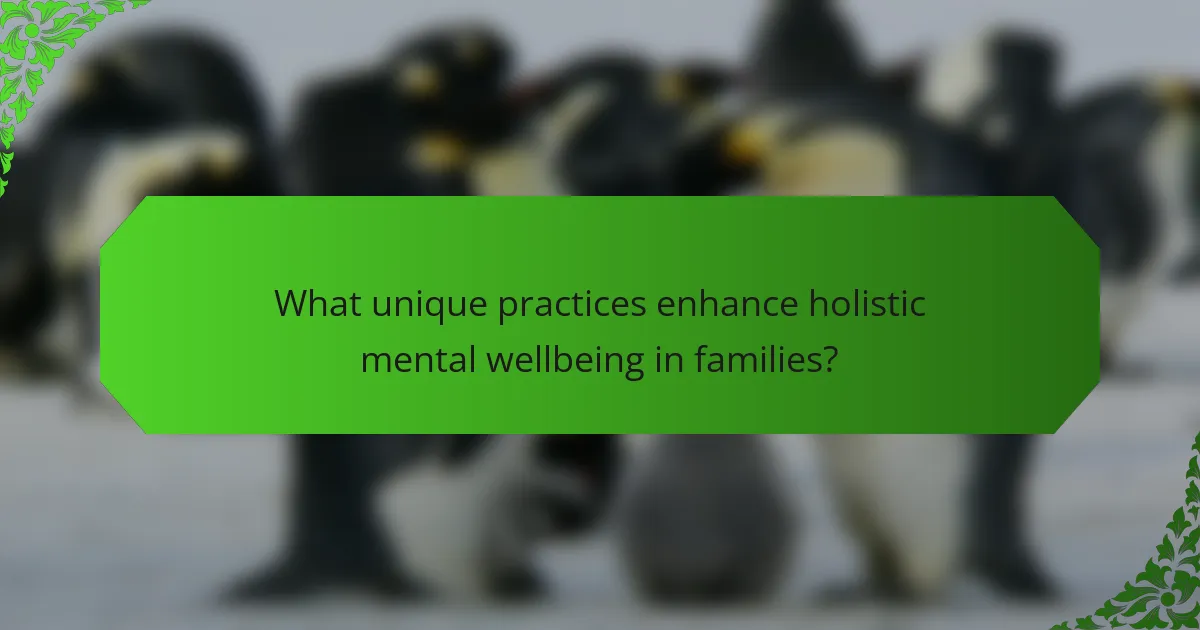
What unique practices enhance holistic mental wellbeing in families?
Holistic mental wellbeing in families is enhanced through practices that foster connection and resilience. Engaging in family rituals, such as weekly game nights or shared meals, strengthens bonds and promotes emotional balance. Mindfulness activities, like yoga or meditation, cultivate awareness and reduce stress collectively. Open communication, where family members express feelings without judgment, nurtures a supportive environment. Additionally, spending time in nature has been linked to improved mental health, fostering a sense of belonging and tranquility. These unique practices create a nurturing atmosphere that enhances overall family wellbeing.
How can family rituals contribute to emotional connection?
Family rituals significantly enhance emotional connection by fostering shared experiences and creating a sense of belonging. These rituals, such as family dinners or game nights, encourage open communication and strengthen bonds. Research indicates that families engaging in regular rituals report higher levels of emotional well-being. Unique attributes of these rituals include their ability to instill a sense of stability and continuity, which is vital for resilience. As a result, families with established rituals often navigate challenges more effectively, promoting a healthier emotional environment.
What are the benefits of nature-based activities for families?
Nature-based activities significantly enhance holistic mental wellbeing for families by fostering resilience, connection, and emotional balance. These activities promote physical health, reduce stress, and improve mood.
Engaging in outdoor experiences strengthens family bonds through shared experiences, enhancing communication and cooperation. Research indicates that nature exposure reduces anxiety and depression symptoms, contributing to overall emotional stability.
Additionally, nature-based activities encourage mindfulness, allowing families to connect with their surroundings and each other. This unique attribute of nature immersion cultivates a sense of gratitude and presence, vital for emotional balance.
Incorporating regular nature activities into family routines can lead to lasting benefits, creating a resilient and supportive family environment.

What rare attributes can be found in holistic mental wellbeing practices?
Holistic mental wellbeing practices often include rare attributes that enhance family resilience and emotional balance. These attributes may encompass unique forms of mindfulness techniques, such as forest bathing, which promotes deep connection with nature, or sound healing, which utilizes vibrations to foster emotional release. Additionally, rare practices like family constellation therapy can reveal underlying dynamics affecting emotional health. Integrating these elements nurtures a supportive environment for families, encouraging profound emotional growth and connection.
How can art therapy uniquely benefit family relationships?
Art therapy can significantly enhance family relationships by fostering communication, empathy, and emotional expression. It provides a unique platform for family members to connect through creativity, allowing them to express feelings that may be difficult to articulate verbally.
One of the key benefits is the development of resilience. Engaging in art therapy together can help families navigate challenges, promoting a sense of unity and shared experience. As a result, family members learn to support each other better, strengthening their emotional bonds.
Additionally, art therapy encourages active listening and understanding. By creating art collaboratively, families can gain insights into each other’s perspectives, leading to improved conflict resolution and deeper connections. This unique attribute of art therapy makes it an effective tool for nurturing emotional balance within the family unit.
What uncommon techniques foster deeper emotional understanding?
Uncommon techniques fostering deeper emotional understanding include active listening, narrative therapy, and mindfulness practices. Active listening enhances empathy by focusing entirely on the speaker, allowing for genuine connection. Narrative therapy encourages individuals to share their stories, facilitating emotional processing and understanding. Mindfulness practices, such as meditation, help families become aware of their emotions, fostering emotional balance and resilience. These techniques nurture holistic mental wellbeing by promoting connection and understanding within family dynamics.
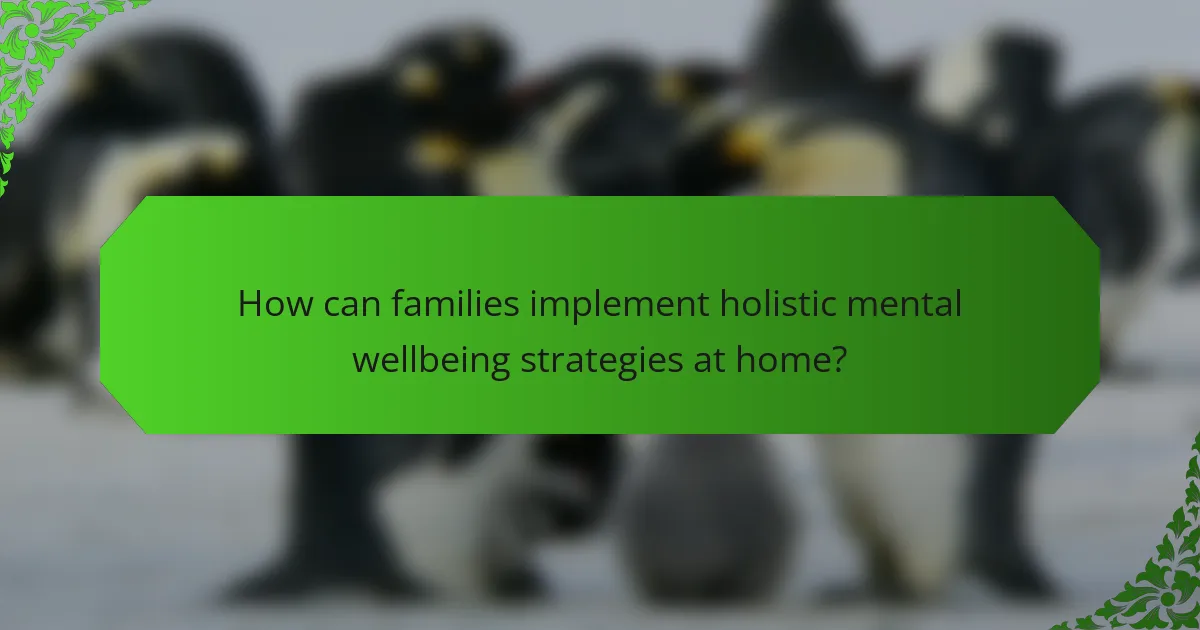
How can families implement holistic mental wellbeing strategies at home?
Families can implement holistic mental wellbeing strategies at home by fostering open communication, establishing routines, and encouraging mindfulness practices. Prioritizing emotional connection strengthens family bonds, which enhances resilience. Engaging in shared activities, such as family meals or outdoor exercises, promotes physical health and emotional balance. Incorporating mindfulness techniques, like meditation or deep breathing, can reduce stress and improve overall mental clarity. Regular check-ins about feelings create a safe space for expression, reinforcing emotional support. These strategies collectively nurture a supportive family environment, essential for holistic mental wellbeing.
What daily practices can enhance emotional balance?
Daily practices that enhance emotional balance include mindfulness, regular physical activity, and nurturing relationships. Mindfulness techniques, such as meditation, improve self-awareness and reduce stress. Engaging in physical activity releases endorphins, promoting a positive mood. Additionally, fostering strong family connections provides emotional support, which is vital for resilience. Prioritizing these practices creates a holistic approach to mental wellbeing, benefiting families collectively.
How can families create a supportive environment?
Families can create a supportive environment by fostering open communication, encouraging emotional expression, and promoting shared activities. Establishing routines enhances stability and predictability, which supports mental wellbeing. Active listening builds trust and connection, allowing family members to feel valued. Engaging in collective problem-solving strengthens resilience and nurtures a sense of belonging. Prioritizing mental health education equips families with tools to navigate challenges together.
What common mistakes should families avoid in this journey?
Families should avoid neglecting open communication, dismissing emotional needs, and overlooking self-care. These mistakes can hinder resilience and connection. Prioritizing emotional balance requires recognizing each family member’s feelings and fostering a supportive environment. Additionally, failing to establish routines may disrupt stability, impacting overall mental wellbeing. Emphasizing shared activities can strengthen bonds, while ignoring conflicts can lead to unresolved issues.

What expert insights can guide families towards better mental wellbeing?
Families can enhance mental wellbeing by fostering resilience, connection, and emotional balance through expert insights. Prioritize open communication to strengthen family bonds. Incorporate regular family activities that promote togetherness and shared experiences. Encourage emotional expression, allowing family members to discuss feelings openly. Implement mindfulness practices, such as meditation or yoga, to reduce stress and improve emotional regulation. Seek professional guidance when needed, as therapy can provide valuable tools for navigating challenges. Establishing routines can create a sense of stability and security, benefiting overall mental health.
How can families measure their progress in holistic mental wellbeing?
Families can measure their progress in holistic mental wellbeing through regular self-assessments and open communication. Establishing clear goals for emotional balance, resilience, and connection fosters accountability.
Tracking emotional states using journals or apps provides insights into individual and collective wellbeing. Engaging in family activities encourages connection and strengthens relationships, promoting a supportive environment.
Utilizing tools like wellness check-ins can facilitate discussions about feelings and experiences, helping families identify areas for improvement. Regularly reviewing these aspects ensures sustained progress in holistic mental wellbeing.
What resources are available for families seeking support?
Families seeking support for holistic mental wellbeing can access various resources. Community centres often provide workshops and counselling services. Online platforms offer virtual support groups and mental health apps. Local non-profits may have programmes focused on resilience-building activities. Schools frequently host parenting workshops that promote emotional balance. Additionally, professional therapists can guide families through tailored mental health strategies.
